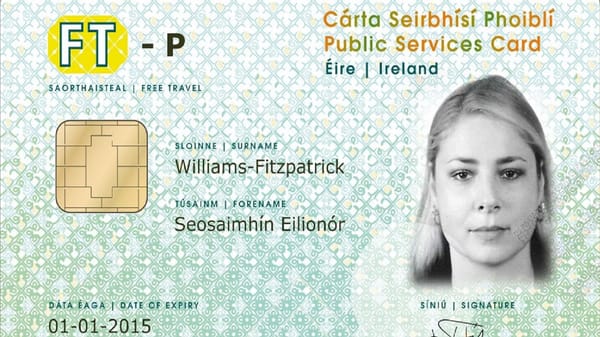The Gist: The Maternity Hospital, in brief
After a week of assertion and counter-assertions we're settling on a generally agreed set of facts about the new National Maternity Hospital plan.

Seeing as we've been reading through these documents for a few days now, and the Minister for Health is before the Oireachtas Committee, readers may find useful a handy summary of what we've found so far.
Ownership of the new Maternity Hospital Building
The Lease between HSE and St Vincent’s Healthcare Group (SVHG) provides for SVHG to own the Hospital and the Buildings. The First Schedule defines the SVHG premises, which includes
“any buildings erected or to be erected thereon and together with all additions alterations and improvements from time to time thereto or thereon.”
The HSE will have a Leasehold interest, but they will never own it outright.
The lease includes covenants controlling the use of the property and the NMH company's constitution also provides for the landlord to nominate 3 of its directors.
Having briefed the Taoiseach, Minister, journalists and officials that it was untrue and misinformation to say the state wouldn't own the building, the Government has since been on a mission to revolutionise Irish Land Law by asserting that Tenants "essentially" own the properties they occupy on a lease.
The Black Box: 'Clinically appropriate"
The Permitted Use the HSE can put the new hospital to is defined in the Lease as
“In relation to the National Maternity Hospital Area as a public hospital primarily for the provision of all clinically appropriate and legally permissible healthcare services, including research, by a maternity, gynaecology, obstetrics and neonatal hospital, and a range of related health services in the community and any other public healthcare service or services”
That creates a two step test for any use of the hospital.
1) clinically appropriate
2) legally permissible.
Number 1 there is undefined and unnecessary. (Also, if I have to type it or say it one more time I may come unmoored.)
On Prime Time, Holles Street's legal advisor said that she was originally very pleased at the insertion of the phrase "clinically appropriate" into the agreement document and then that;
We did not foresee that this would be taken and flipped.
Ambiguity results in unexpected, unwanted or sometimes perverse-seeming interpretations being placed on the disputed phrases.
The Minister has said this phrase was introduced at HSE request.
It can therefore be removed without damaging the deal otherwise.
It should.
If it is not removed, it should be defined by way of a list of controversial procedures which are presented as “including but not limited to” which will answer the complaint that a list might limit further medical developments over time.
Constitution of New NMH company: The Man with the Golden Share
The new company which is going to run the fresh new National Maternity Hospital sets out its Principal Object at Section 3.1
The principal object for which the Company is established is the promotion of health, in particular by the provision of all clinically appropriate and legally permissible healthcare services, including research, by a maternity, gynaecology, obstetrics and neonatal hospital, and a range of related health services in the community.
This means that the company’s officers are bound to only perform activities that meet the 2 step test (sing it with me);
1) clinically appropriate
2) legally permissible.
The Minister has a golden share where he can oblige the directors to take actions if they don’t provide any and all ‘legally permissible’ healthcare services. His powers are reassuringly strong sounding when you read them in isolation (as he is wont to do)...
Except...
The Health Minister’s golden share powers are only able to be exercised if they are in compliance with that two step test too. That is because they are part of the Reserved Powers (Section 5 of the NMH Constitution)
And all the reserved powers are “exclusively subsidiary and ancillary to the principal object”.
5.1 “The Company shall, in addition to the powers conferred on it by law, have the following powers (the “Reserved Powers”) which are (i) exclusively subsidiary and ancillary to the principal object and which are to be carried out in furtherance of the principal object”
In short, the Minister's Golden Share has been placed too far down in the stacked hierarchy of rights and obligations to be able to overrule a challenge to action based on any future interpretation of the phrase "clinically appropriate" in the Principle Object clause of the new NMH company.
Costs
The rent due to the Landlord (St Vincent's Healthcare Group) is set at €850,000 per year in the lease with a rent review every 10 years for 299 years.
That Rent is abated to €10 if the Tenant follows conditions in its use of the Premises.
Those Conditions include a requirement that they do not use it for any purpose that doesn’t meet the ‘clinical appropriateness’ test. The rent goes up to the €850,000 if they do.
Lease Section 4 (c) “yearly rent shall be abated to €10 per annum for so long as each of the following conditions are complied with; there is no change to the Permitted Use without the consent of the Landlord;”
Religious ethos
A body can have a religious ethos even if not owned by a religious order.
Last night two of the members of the Board of the HSE issued a statement saying
"Boards also influence the culture, values and ethics of the entity they govern and this gives rise to legitimate concerns for us about the potential influence of ethos."
St Vincent’s Hospital Group's Board of Directors are bound to follow the company’s constitution. St Vincent's Hospital Group are the Landlords of the new hospital premises and they are the 99% owners of the New NMH company and they nominate 3 of the 9 directors of that company.
The St Vincent's Healthcare Group's brand new constitution says that they were "founded by Mary Aikenhead as part of her mission to provide Service to the Poor". They go on to say the company is engaged in a "continuation of the fulfilment of this mission" and goes on to describe its core values as;
Human Dignity: Respect the dignity and uniqueness of each person
Compassion: Accept people as they are, bring empathy and care to all
Justice: Act with integrity which respects the rights of all
Quality: Strive for excellence in all aspects of care
Advocacy: Speak for the voiceless, act with and for them to achieve the appropriate quality of care.
Basically
We can accept the absolute bona fides of everyone involved in this project while also acknowledging that the text of the agreement documents as they currently stand leaves the provision of services open to challenge on the basis that the challengers believe they are not in line with the undefined test of ‘clinically appropriate’.
Whoever those challengers may be in future, either outsiders (a SPUC-style situation) or future SVHG or New NHM board members, we cannot predict the behaviour of officeholders charged with interpreting ambiguous legal texts for the next 299 years. Nor can we predict what every possible court would decide was the correct interpretation of that phrase over the same timescale.
A way forward
The State should
1) Ask the brand new owners of SVHG to gift or sell us the land. The new owners are not bound by the Vatican rules on disposing of assets which tied the nuns' hands. According to Stephen Donnelly, the request to purchase hasn't been put since Simon Harris was Minister for Health. Well, with independent new owners of St Vincent's Healthcare Group comes a chance for a fresh start.
2) Delete the phrase ‘clinically appropriate’ from the governing clauses in each of the documents. This, by itself, is the most effective, fastest and easiest step which could be taken to ensure the provision of all the healthcare services we expect to see in a modern National Maternity Hospital. It doesn't effect the state's curious suggestion that they need to specify it will be a maternity hospital- that's already dealt with in the text confirming it will provide "healthcare services, including research, by a maternity, gynaecology, obstetrics and neonatal hospital".
The whole agreement balances on the interpretation of the phrase "clinically appropriate" by every court and set of St Vincents directors for the next 300 years. Moving forward without removing this ambiguity is a recipe for unending and unpredictable legal traumas, as we saw with the alphabet of pain (X case, C case) following the insertion of the 8th Amendment.
3) If, for reasons unknown and as yet unexplained, the State refuses to remove the 'clinically appropriate' phrase, they should define it with a list of healthcare services people are worried might not continue after the move from Holles Street and preface it by saying that the definition 'includes but is not limited to' that list. This allows for future expansion of services as healthcare evolves without any need to amend the Constitution of the company.
If they don't change the plan at all from what they have presented today (and that is currently what they are briefing will be their intention) they may expect that absolute majority of the public who oppose it to make their feelings known, immediately but also at the next election.
It won't have passed Government TDs that the failure of Fine Gael's most recent candidate in the Dublin South by-election was in part attributed to his association with the anti-choice Renua party. Appearing to stand against the tide of Repeal - a defining political moment for a great number of people- is not a path to electoral success.
Voting through an avoidable legal quagmire is similarly unlikely to prove popular as the consequences unwind between now and the next election.




